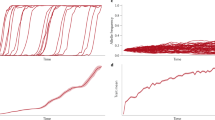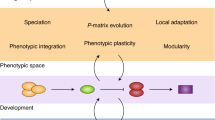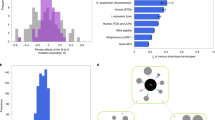Abstract
THE ‘polygene’ hypothesis was proposed by Mather1 to explain the sudden responses to selection which occurred in his experiments and in those of Payne2. Similar patterns of response to selection have been found by Sismanidis3, Thoday and Boam4, and Fraser and Hansche5. This phenomenon of sudden responses to selection is clearly distinct from the predictable, relatively smooth type of advance which is exemplified by the results of Clayton, Morris and Robertson6.
This is a preview of subscription content, access via your institution
Access options
Subscribe to this journal
Receive 51 print issues and online access
$199.00 per year
only $3.90 per issue
Buy this article
- Purchase on Springer Link
- Instant access to full article PDF
Prices may be subject to local taxes which are calculated during checkout
Similar content being viewed by others
References
Mather, K., J. Genet., 41, 159 (1941).
Payne, F., Indiana Univ. Studies, 36, 1 (1918).
Sismanidis, A., J. Genet., 44, 204 (1942).
Thoday, J. M., and Boam, T. B., Genet. Res., 2, 161 (1961).
Fraser, A. S., and Hansche, P. E., Genetics Today, 2 (Pergamon Press, London, 1964).
Clayton, G. A., Morris, J. A., and Robertson, A., J. Genet., 55, 131 (1957).
Author information
Authors and Affiliations
Rights and permissions
About this article
Cite this article
NASSAR, R., FRASER, A. Selection and Polygenes. Nature 206, 323–324 (1965). https://doi.org/10.1038/206323a0
Issue Date:
DOI: https://doi.org/10.1038/206323a0
This article is cited by
-
Effect of Hyperbaric Pressure Treatment on the Growth and Physiology of Bacteria that Cause Decay in Fruit and Vegetables
Food and Bioprocess Technology (2014)
-
The analysis of genetic consequences of selection and inbreeding in Drosophila melanogaster
Genetica (1980)
-
Effects of temperature on selection for scutellar Bristles
Heredity (1970)
Comments
By submitting a comment you agree to abide by our Terms and Community Guidelines. If you find something abusive or that does not comply with our terms or guidelines please flag it as inappropriate.



